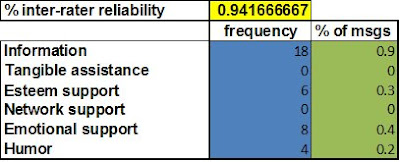Matt Rawding (Brown Group)
Emily Etinger (Blue Group)
In this assignment, we examined social support in online spaces. The space we examined was a thread in Google Groups, Eating - alt.support.depression, about a father who had a young daughter who wasn't eating. He was looking for advice on how to get his daughter to eat. This thread contained many messages from various people and each message contained some aspect of support as defined by Braithwaite et al. We found that the most common aspect of social support was "information" in the messages. We also didn't find any messages containing "tangible assistance" or "network support."

There were some similarities between our results and the results in the Braithwaite et al study. In the study, "tangible assistance" and "network support" were the least common traits in support messages, and our findings were similar. Because our sample size was so small, we didn't even have any examples of either trait. In the messages we examined, we found that 40% of them contained emotional support, which is the same amount that the study found. However, the main difference between our results and the results in the study was the percentage of messages that contained "information." Our study found that 90% of the messages had "information" whereas Braithwaite et al only found 31.3% of the messages to contain "information." One reason for this could be that the members of the thread that we examined didn't know each other very well. In a forum where members post often and develop online relationships, it is more likely that the messages there will have "emotional support" or "esteem support" and less "information." There was also one person in this thread who posted very short messages, each with only "information" on how to resolve the problem, but no support in other forms. All of the messages we read exhibited at least one of the social support traits.

The creator of the thread is sharing something very personal over the internet, and strangers are more than willing to respond and give advice. These actions align with social distance theory. People are more willing to open up and share details about themselves over the internet than they are face-to-face. The creator of this thread was able to get advice from strangers without having to leave their home (assuming they own a computer), advice they would not have received if they had spoken face-to-face with someone they knew. Another interesting thing we noticed about threads was that many of them are not very active. Wallace explains this with her theory of numbers on the internet. She says that someone reading a thread may not respond because that person will believe there are many other people willing to help so it is not important for them to respond.
2 comments:
To comment on the last part of the blog, it makes perfect sense that other people would diffuse the responsibility and tell themselves that "other people, who are probably much more qualified than I am" will take care and help this person. This happens less online than in person though, because people never actually know how many people are involved in their specific support group online. In order to receive help right away in person when you are in a crowd and needing assistance, you should call out to someone and ask them personally for help. We learned about this in Psych 101 and it makes perfect sense. It is important to make someone feel responsible, so that they don't just walk away from you. Although this type of "calling out" is hard over the internet, it might be important in order to receive help or advice in a timely fashion. Write a post directing your question to someone, so that they feel the responsibility to write back in a timely manner. Just a thought...
Was this forum blocked for limited access? A lot of the support groups that I looked up for more serious issues (such as depression and anxiety) were blocked. Assuming because they are trying to filter out people who are messing around, and looking for people who truly want to help. Since you said the information was prevalent in your messages, i was curious to know if the information was always positive. I believe that it is common to have eating disorder sites that are supposed to be support groups for what would seem like stopping one's eating disorder but instead the group supports having the eating disorder. And the information includes topics such as what food will contan the least amount of calories but make you feel full, how not to get recognized, and so on. I wonder if there is a way to differentiate between negative and positive support? Or is that too subjective?
Post a Comment